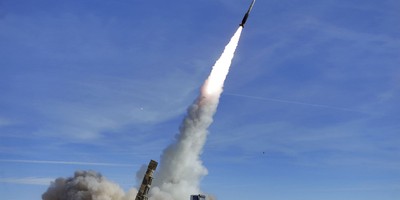There’s something different about this year’s presidential campaign. It’s not just the front-loaded process or the wide-open nature of the primaries. What’s different is the relentless focus on “change.”
“I spent my life changing things. I did not spend my life in politics, talking about changing things,” Republican candidate Mitt Romney said a few weeks ago. On the Democratic side, Hillary Rodman Clinton, John Edwards and Barack Obama have all promised to deliver “change.”
But remember, when liberals talk about change they don’t mean changes they could personally make. No, liberals are perfectly content to have Al Gore flying around the world giving speeches and collecting awards, while leaving every light burning in his Nashville mansion. There’s no need for him to “change” his behavior, because he’s buying “carbon offsets” to reduce his “carbon footprint.”
Set aside the fact that carbon offsets are a farce. In The New York Times last year, environmentalist Denis Hayes of the Bullitt Foundation compared carbon offsets to the practice in the Middle Ages of buying indulgences. “Instead of reducing their carbon footprints, people take private jets and stretch limos, and then think they can buy an indulgence to forgive their sins,” he noted. Offsets only work, to the extent they do at all, because many Third World countries -- lacking modern technology -- don’t emit much carbon.
But keep in mind that things are going to “change” in these countries. They’re going to keep getting better.
Look no further than the Tata Nano, a tiny car unveiled last week in India. It will cost just $2,500, and thus as Henry Ford’s Model T did 100 years ago in the U.S., it will make owning an automobile something that members of India’s rising middle class can afford. Think of what that means for average Indians: They’ll suddenly have the ability to visit relatives, live farther from work, shop and buy in bulk.
Recommended
And while the car may be a deathtrap by Western standards (it’s made of plastic and glue instead of steel), it will get 50 miles per gallon and meets Europe’s stringent emissions standards, which are far tougher than the ones it actually has to meet to pass muster on the subcontinent. Still, many environmentalists can see only the downside.
“This car promises to be an environmental disaster of substantial proportions,” Daniel Esty, an environmental expert at Yale, told Newsweek. Other environmentalists aren’t ready for the change. “In none of our reports did we assume there’d be a car like this,” Judy Greenwald, the director of innovative solutions at the Pew Center on Global Climate Change, told the magazine. “This is a new category. It will affect everybody’s projections.” Well, heaven forfend we have to “change” our projections so people can enjoy a better life.
Lately the Democratic candidates have been sparring over race. Something about the differences between MLK and LBJ. But isn’t the ultimate example of racism the very idea that millions of people in India and Africa (because they happened to be born in the “wrong” place) must remain poor so we in the West can congratulate ourselves on our struggle against climate change?
Yes, millions of new cars will mean more pollution, and the world will have to deal with that. We’ve done so in the past, and will again in the future, by developing new technologies. As Indians become wealthier, they’ll demand a cleaner environment (as people in, say, Cleveland did decades ago). Humans will develop new ways to clean the air, and we’ll eventually develop new modes of transportation that don’t require fossil fuels.
Meanwhile, if there’s one constant about the environment, it’s that it changes. More than 100 million years ago, India broke off from Africa and drifted away. When it smashed into Asia, it started forming the Himalayas. Mt. Everest is still rising, so it’s higher today than when Sir Edmund Hillary climbed it in 1953.
Over the millennia there have been many such events, and they’ve obviously “changed” the climate of the planet. There wasn’t a thing humans could do about any of them. In much the same way, it’s safe to assume the climate will change over the next 100, 1,000 and 100,000 years. Trying to end “climate change” is a pointless waste of time.
The liberal presidential candidates want to prevent any changes to the things they have no control over. In the end, life is getting better for most people on the planet, and that’s a trend that’s likely to continue. There’s no reason we should want it to change.

























Join the conversation as a VIP Member